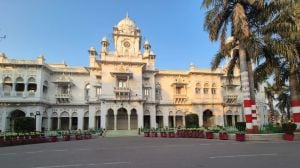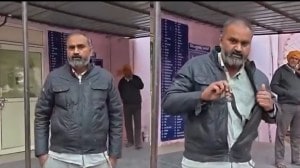Dale Carnegie, Move Over
Pakistani President Pervez Musharraf has mastered the art of fooling Washington. Whenever he is pushed to the edge, he hands over one terror...

Pakistani President Pervez Musharraf has mastered the art of fooling Washington. Whenever he is pushed to the edge, he hands over one terrorist to the US and earns brownie points8212;both in terms of image enhancement and monetary aid. I wonder why one simple question is never asked of the General: if Pakistan is so committed to the global anti-terror coalition and vows to deal with terrorists so severely, how did all those Al Qaeda men take refuge in Pakistan and not in Iraq or Lybia, the so-called breeding grounds of terror? Soon after it was known8212;courtesy Al Jazeera8212;that the chief plotter of the 9/11 attack was in Pakistan, General Musharraf promptly arrested him and handed over to the US authorities. Such immediate action was possible only because Pakistan knew all along where exactly these guys were holed up.
It was evident that the office of our Permanent Representative to the UN and our US Mission didn8217;t do their homework. As a result, Musharraf got easy mileage in terms of international media coverage. While Vajpayee8217;s brilliant and incisive arguments remained restricted to the Indian media, foreign media, including BBC and CNN, carried more on Musharraf.
Disinvestment: Some Hard Facts
I recently met Anil Agarwal, the owner of Sterlite of BALCO fame at a party in London. Agarwal made a startling revelation: that the man who8217;s backing his industrial ventures the most is his one-time bugbear, Chhattisgarh Chief Minister Ajit Jogi. While Jogi8217;s co-operation prompted Agarwal to invest another Rs 5,000 crore in the state, his sudden change of heart is based on some hard facts. Contrary to popular apprehension, BALCO didn8217;t down its shutters. Not a single worker was retrenched. After initial resistance, Jogi soon realised the pluses of successful privatisation from the BALCO experience.
This is something for opponents of disinvestment to consider. Cases where devaluation took place, particularly hotels, could have been singled out for fresh valuation and nobody would oppose delaying divesting such units. A number of hotels, for example, were given at prices which didn8217;t even cover their land costs. Good hotels have been sold at the price of Rs 2 crore, for which you can8217;t even buy a sizeable flat any more.
But a blanket ban simply defies logic. Exemplary cases like BALCO or IPCL apart, Modern Foods, Kochi Refineries, Chennai Petroleum, VSNL, IBP, IPCL, Maruti were all good money deals. It8217;s the duty of the government to ensure that no PSU closes down and, at the same time, loss making units don8217;s bleed government coffers. Unfortunately, the decision to put all disinvestment cases on hold for three months will only delay the unshackling of our economy.
Unhealthy Criticism
Shatrughan Sinha is a trifle upset over the hue and cry made over his foreign trips as minister. His contention is he was travelling for official work, and all his trips 8212; to Spain for an AIDS conference, Germany and the US seminar on Indian systems of medicine and a conference of American physicians of Indian origin and Indonesia where he was elected chairman of the International Health Ministers8217; Conference in South-east Asia 8212; were approved by the PM. What8217;s more, the Health Minister has visited the USA over 50 times on his own.
Shatru has another reason to feel miffed: months after he was named health minister, he8217;s still staying in a type six Talkatora Road bungalow meant for MPs. Initially, a bungalow at 4, Krishna Menon Marg was allotted to him. But even after Urban Development Minister Ananth Kumar objected that a former vice-president8217;s widow wasn8217;t entitled to a type eight bungalow, Mrs Krishna Kant got the premises sanctioned by the Prime Minister. Next, Shatru was promised the 12, Wellingdon Crescent bungalow, which was at one time Indira Gandhi8217;s residence. But P C Alexander already had his eye on it. Finally, Shatru was told that he could move into 9, Safdarjang Road once TDP leader Yerran Naidu vacated it. But Naidu changed his mind and refused to hand over the bungalow.
- 01
- 02
- 03
- 04
- 05































